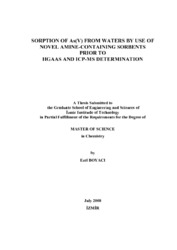Please use this identifier to cite or link to this item:
https://hdl.handle.net/11147/3450| Title: | Sorption of As (V) from waters by use of novel amine-containing sorbents prior to HGAAS and ICP-MS determination | Authors: | Boyacı, Ezel | Advisors: | Eroğlu, Ahmet Emin | Publisher: | Izmir Institute of Technology | Abstract: | A novel sorption method utilizing several amine-containing sorbents was developed for arsenic determination in waters by hydride generation atomic absorption spectrometry (HGAAS) and inductively coupled plasma mass spectrometry (ICP-MS).Chitosan, chitosan-immobilized sodium silicate, chitosan-modified macroporous silicate, and aminopropyl triethoxysilane-treated macroporous silicate were among the sorbents investigated for As(V) sorption.Sorption parameters were optimized for As(V) using chitosan and chitosanimmobilized sodium silicate and were then applied in all sorption studies. These parameters, namely, sorption pH, amount of sorbent, reaction temperature, and shaking time were 3.0, 50.0 mg, 25 .C, and 30 min, respectively. The sorption for chitosan under the optimized conditions was 89% (±1) while that for As(III) was lower than 10% at all pHs. In addition, chitosan-modified and amine-modified macroporous silicate demonstrated 88% (±3) and 68% (±12) sorption, respectively. After the sorption, the release of arsenate from chitosan and chitosan-immobilized sodium silicate was realized using two eluents; namely, 2.0% (v/v) acetic acid which dissolved chitosan, and 1.0% (w/v) L-cysteine solution having a pH of 3.0 adjusted with HCl which eluted arsenate by reducing to arsenite. Their respective desorption percentages were 90% (±1) and 100% (±4) for chitosan, and 67% (±2) and 100% (±1) for chitosan-immobilized sodium silicate.The preconcentration study performed using an absolute amount of 150.0 ng As(V) in bottled drinking water at the enrichment factors of 1, 2, and 10 has given 98% (±3), 95% (±2), and 78% (±4) recoveries, respectively. The accuracy of the proposed methodology with chitosan was verified with spike recovery tests for various water types at a concentration of 10.0 .g/L As(V). With matrix-matched calibration, the percentage spike recovery values were determined to be 114 (±4), 112 (±2), 43 (±4), and 0 (±1), for ultrapure, bottled, tap and sea water, respectively. These results have shown the strong suppression effect of the tap and the sea water matrixes. | Description: | Thesis (Master)--İzmir Institute of Technology, Chemistry, İzmir, 2008 Includes bibliographical references (leaves: 93-99) Text in English; Abstract: Turkish and English xiv 99 leaves |
URI: | http://hdl.handle.net/11147/3450 |
| Appears in Collections: | Master Degree / Yüksek Lisans Tezleri |
Files in This Item:
| File | Description | Size | Format | |
|---|---|---|---|---|
| T000698.pdf | MasterThesis | 2.18 MB | Adobe PDF |  View/Open |
CORE Recommender
Page view(s)
132
checked on Nov 18, 2024
Download(s)
96
checked on Nov 18, 2024
Google ScholarTM
Check
Items in GCRIS Repository are protected by copyright, with all rights reserved, unless otherwise indicated.